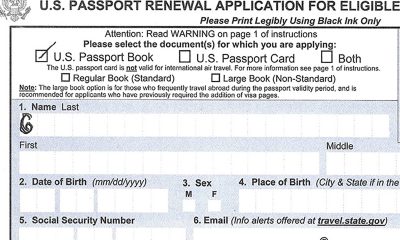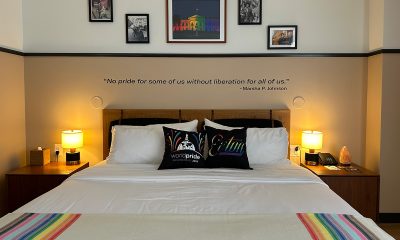Local
Probable cause found that off-duty cop fired gun at trans women
Judge orders D.C. officer held without bond
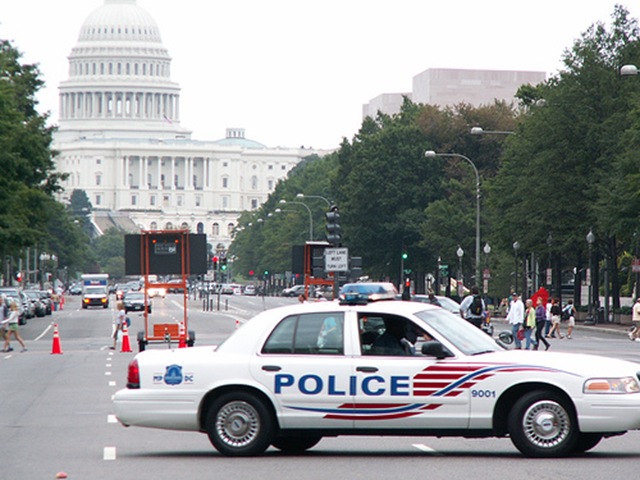
A D.C. Superior Court judge on Sept. 2 ruled that prosecutors established probable cause that an off-duty D.C. police officer committed an assault with a dangerous weapon for allegedly firing a pistol at three transgender women and two male friends during an Aug. 26 incident in Northwest Washington.
Judge Ann O’Regan Keary ordered Officer Kenneth Furr, a 21-year veteran on the force, held without bond pending his trial. Keary said evidence presented by police and prosecutors showed that releasing the officer would pose a danger to the community.
The judge’s ruling came during a preliminary hearing in which First District police Det. James Freeman provided detailed testimony about his investigation of the incident.
Freeman testified that the victims and at least two D.C. police officers who were in the vicinity of the shooting reported that Furr stood on the hood of a car in which the victims were sitting and fired at them through the windshield.
He said witnesses and the victims reported that the incident began about 4:40 a.m. at a CVS drug store at 400 Massachusetts Ave., N.W., when Furr and one of the shooting victims reportedly got into a “verbal altercation.”
Transgender activist Jeri Hughes said one of the transgender women involved in the incident told her the verbal altercation inside the CVS store started when Furr approached one of the transgender women and invited her to engage in sex. Furr reportedly became angry when she turned him down, Hughes said, prompting the woman’s male friend to exchange words with Furr in an effort to get him to leave the woman alone.
Freeman testified that Furr and the same person who argued with Furr inside the CVS store exchanged words outside the store a short time later while Furr was sitting in his car parked nearby.
According to Freeman, Furr reportedly retrieved a handgun from the glove compartment of his car, pointed it at the person and threatened to shoot the person, who is believed to be one of the male friends of the trans women.
The same person returned to the CVS store and told a security guard that Furr had threatened him with a gun, a police affidavit says. The victim then met up with the other four people, including the three transgender women, and all five got into one of their cars and followed Furr, who drove away in his car, Freeman testified.
When both cars reached the intersection of First and Pierce streets, N.W., Furr jumped out of his car and began to shoot at the car where the five others were riding, Freeman told the court hearing. The shooting prompted the driver to crouch down to avoid being hit, causing the car he was driving to collide with Furr’s car, Freeman said.
That’s when Furr apparently climbed on the hood of the other car and fired his gun through the windshield, the victims and police witnesses reported.
Police and transgender activists who spoke with at least two of the victims said two of three transgender women in the car suffered non-life threatening gunshot wounds during the incident. Transgender activists said one of two male friends who were in the car was also was struck and suffered serious but non-life threatening wounds. All three were treated in area hospitals, the activists said.
In his testimony at the Sept. 2 hearing Freeman recounted details from a police affidavit he prepared that lists each of the five people in the car as unidentified witnesses. Neither the affidavit nor Freeman during his court testimony mentioned that three of the five people in the car at which Furr allegedly fired his gun were members of the transgender community.
News that some of the victims were members of the transgender community emerged from a police news release on the day of the incident. Deputy D.C. Police Chief Diane Groomes made personal calls to LGBT activists shortly after 5 a.m. on Aug. 26, just minutes after the incident occurred, to inform them of what happened and to note that police and the department’s Gay and Lesbian Liaison Unit were investigating the incident.
Assistant U.S. Attorney Lara Worm argued at the court hearing that police provided sufficient evidence that probable cause exists that Furr committed an assault with a dangerous weapon two times – once when he pointed the gun at one or two of the victims outside the CVS store and another time when he fired his gun at the victims while they were in their car.
Furr’s defense attorney, Harold Martin, told Keary accounts of the incident by various witnesses appeared to differ, making it difficult to determine the events that led to the shooting. He noted that the car in which the five people were riding followed Furr in the “wee hours of the morning” and Furr had a legal right to defend himself if he believed he was in danger.
He also pointed to the police affidavit’s assertion that one of the victims admitted to being drunk at the time of the incident and another victim admitted to having smoked marijuana the night prior to the incident.
“There are a lot of unanswered questions about what happened that night,” he said.
“The defendant exhibited extremely reckless behavior,” Worm told the judge. “He shot at least five times and certainly all five could have been killed.”
She pointed to a statement by at least one of the victims that Furr shouted “Ima kill all of you” before he started shooting into the vehicle.
Worm noted a police breadth test also found that Furr “had been drinking a substantial amount of alcohol” and that he had a prior arrest in D.C. for driving while intoxicated. Police initially charged Furr with driving while intoxicated in the latest incident but the U.S. Attorney’s office did not file that charge in court.
Nearly a dozen family members and friends of Furr’s sat in the courtroom during the hearing, a fact that defense attorney Martin mentioned while arguing that Furr’s strong community ties were among the grounds for allowing him to be released while awaiting trial.
But Keary, in issuing her ruling on the matter, said the government met the legal criteria needed to have Furr held in jail, saying no combination of circumstances or mitigating factors could override her belief that Furr would pose a danger to the public if released.
She scheduled a status hearing for Oct. 7. The case was expected to go before a grand jury in the next few weeks.
District of Columbia
Ruby Corado sentencing postponed for third time
Attorneys say former Casa Ruby director has ‘significant medical issues’
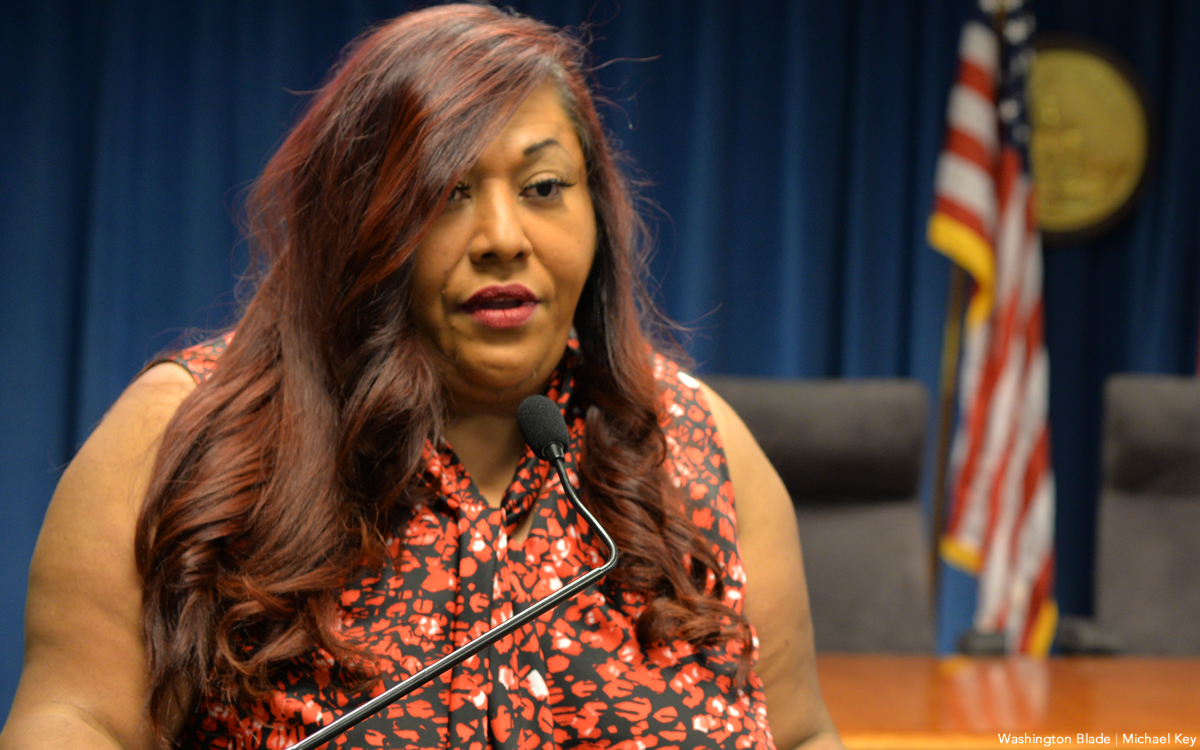
A federal judge on April 8 approved a request by defense attorneys to postpone the sentencing of Ruby Corado, the founder and executive director of the now closed D.C. LGBTQ community services organization Casa Ruby on a charge of wire fraud, from April 29 to July 29.
Court records show that Judge Trevor N. McFadden of the U.S. District Court for the District of Columbia approved a motion filed by Corado’s two defense attorneys on that same day calling for the sentencing postponement on grounds of health issues.
“Ms. Corado has significant medical issues,” the April 8 motion states. “She has an important medical appointment related to one of her diagnoses scheduled in June 2025 and will need time to recover from that appointment,” it says.
The motion gives no further details on Colorado’s medical issues. A.J. Kramer, director of the D.C. Office of the Federal Public Defender, whose attorneys are representing Corado, said the office has a policy of never disclosing specific medical related information regarding its clients.
Court records show that prosecutors with the Office of the U.S. Attorney for D.C. did not object to the defense motion seeking the third sentencing postponement.
The records show that an earlier postponement of the sentencing, from March 28 to April 29, was initiated by the judge due to a scheduling conflict. The first postponement from Jan. 10 to March 28 came at the request of Corado’s attorneys, court records show.
Corado pleaded guilty on July 17, 2024, to a single charge of wire fraud as part of a plea bargain deal offered by prosecutors. The charge to which she pleaded guilty says she allegedly diverted at least $150,000 “in taxpayer backed emergency COVID relief funds to private offshore bank accounts for her personal use,” according to a statement released by the U.S. Attorney’s office.
Prosecutors have said funds that Corado allegedly diverted for her own use were intended to be used by Casa Ruby in support of its various programs, including housing services for homeless LGBTQ youth and support for LGBTQ immigrants.
The U.S. Attorney’s statement also notes that in 2022, when “financial irregularities at Casa Ruby became public,” Corado sold her home in Prince George’s County, Md. and “fled to El Salvador.” It was at that time that Casa Ruby ceased its operations.
Court records show that FBI agents arrested Corado on March 5, 2024, at a hotel in Laurel, Md., shortly after she returned to the U.S. At the request of her attorney and against the wishes of prosecutors, another judge at that time agreed to release Corado into custody of her niece in Rockville, Md., under a home detention order.
The release order came seven days after Corado had been held in jail at the time of her arrest by the FBI.
Under the federal wire fraud law Corado could be sentenced to a possible maximum sentence of 30 years in prison, according to the U.S. Attorney’s statement. However, court observers have said that due to Corado’s decision to waive her right to a trial and plead guilty, prosecutors will likely ask the judge to hand down a lesser sentence than the maximum sentence.
The statement by prosecutors points out that Corado’s decision to plead guilty to the one charge came after she had been charged in a criminal complaint filed on March 1, 2024, with bank fraud, wire fraud, laundering of monetary instruments, monetary transactions in criminally derived proceeds, and failure to file a report of foreign bank accounts.
All those charges except for the wire fraud charge were dropped at the time of her guilty plea.
District of Columbia
A room with Pride: D.C.’s LGBTQ history finds a new home at the Eaton
New suites highlight city’s queer community

Blocks away from where Frank Kameny once organized the first pickets for gay rights in Washington, a new hotel suite invites guests to relax, recharge, and revel in the LGBTQ history of the city with the capital’s first-ever Pride-themed room at the Eaton Hotel.
From the walls covered in Washington Blade archival photos from the past 50 years, to a vinyl library that spans decades and genres of music celebrated by LGBTQ fans, and little affirmations written on the mirrors, it becomes clear as soon as you open the door that this room is one of a kind.
The Blade sat down with Nina Ligon, the director of culture for the Eaton, in the suite to discuss why the boutique hotel has chosen to debut a Pride-themed room and how their unique mission-driven hospitality is at the center of it all.
Starting with how the relationship between the Blade and Eaton came to be, Ligon explained that the collaboration with D.C.’s principal LGBTQ newspaper has been around longer than she has been with the hotel.
“The Blade has always been present,” Ligon said. “It’s one of the entities here in the city that’s just always been around. When I came into my position here at Eaton, Sheldon Scott — our original director of culture who helped open the hotel — already had a relationship with Stephen [Rutgers] and other members of the Washington Blade. Through that we have been able to establish a really strong relationship in the city.”
That relationship flourished after the boutique hotel, which sees itself as more than a hotel — but a cultural hub for those wishing to explore Washington — was nominated for the Best of LGBTQ DC Awards, given out and published by the Blade.

“Beginning in 2022 we were first voted for best LGBTQ hotel in the city by the Best of LGBTQ DC Awards,” she said. “In 2023 we fell off, but that’s all right. We did get Editor’s Choice in 2024, and we’re gonna make a comeback.”
That comeback, Ligon hopes, is aided by the addition of the new Capital Pride-themed hotel suite, which used feedback from LGBTQ hotel staff to determine what went in the room.
“It’s community. We have a really great team here at Eaton, so we were able to put together a committee with anyone who wanted to be involved and have some say. And that’s not just the pride suite specifically, but World Pride in general — in our pride efforts, 365, right throughout the year. A lot of these,” she said, pointing to the walls covered in framed photos taken from the Blade archive, “are ideas that came up during those early meetings just a few months ago. There were discussions of inflatable chairs and disco balls, and I was for it. I’m here to support their creative vision. And you know, we have to involve the corporate folks, and they’re a little more traditional than some of us. But the team really came together with some of the pieces and the timeline wall art that we’re working on.”
Ligon continued, explaining that special attention was given to ensure diverse LGBTQ experiences are represented in the room. From the pictures of LGBTQ icons like Marsha P. Johnson and RuPaul, to the music on their sound system (including Chappell Roan’s “The Rise and Fall of a Midwest Princess” and Troye Sivan’s “Bloom”), and the quotes on the walls, their goal was to uplift the whole LGBTQ community rather than one particular identity.
“My colleague, Eduardo [Romero], who’s been just a beam of light in my life, brought this to my attention. As a Black woman, I was reading through the Blade’s archive links and was sifting through some of those and he was like, ‘Okay, yeah, these look good, but there’s some people who are missing.’ Capital Pride has been traditionally cis, white male led. He helped me, as a Black woman, to step back and say. ‘Say, oh, wait, there’s more that we can be representing here. There are more people we could be representing.’ And so I reached out to DC Black Pride to see what image imagery they may have had and what input they had. And we were able to come up with a little something.”
As the tour of the room came to a close, Ligon told the Blade what she hopes people get from staying in this suite.
“When it comes to Pride, Pride is resistance,” she said. “Pride is more than just a party. Pride is an opportunity. It started with people who were fighting for their rights and their mere existence. And so I really want people, whether they come here to party or to take a load off, I really want them to take some time to reflect and see Pride for what it is, and that first being a form of resistance as we chart the course forward into a brighter future for the LGBTQ community and for all. None of us are free until we are all free. And I hope that this will be a reflection of that.”
The Eaton Hotel is at 1201 K St., N.W.
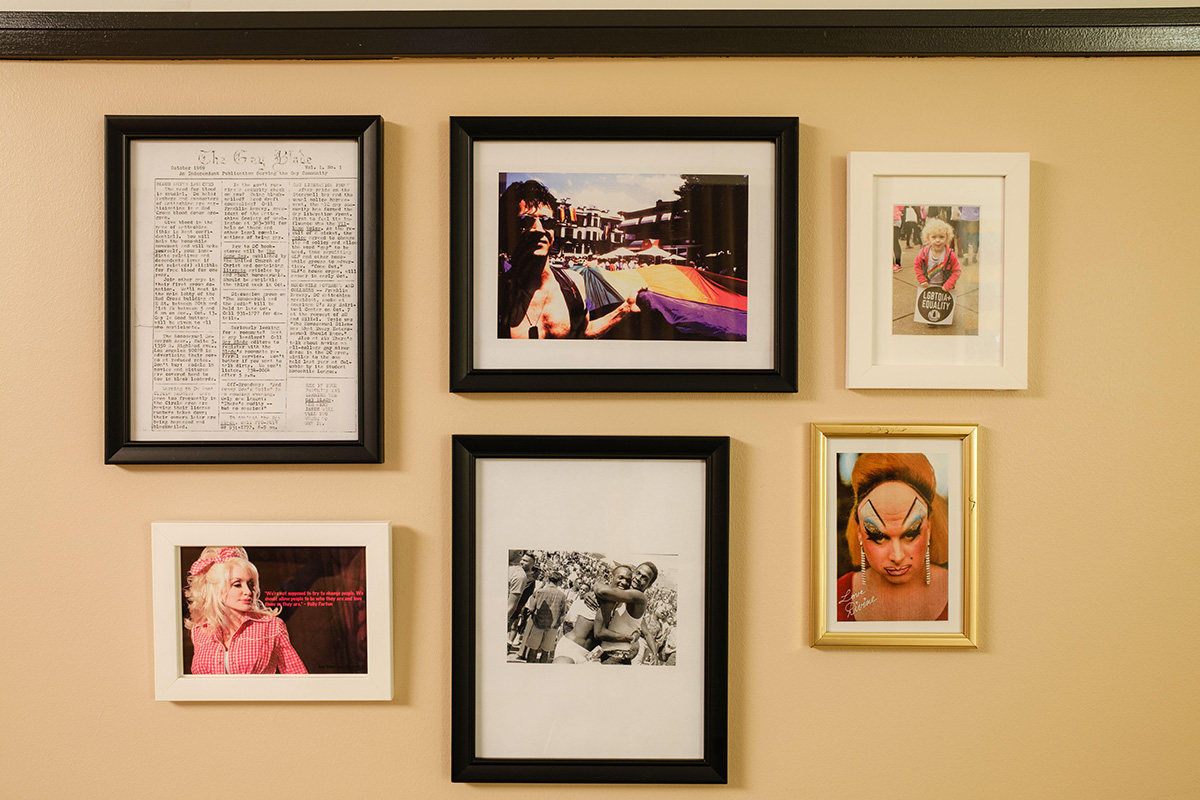
Opinions
We must show up to WorldPride 2025 in D.C.
Boycotts offer symbolic protest, but absence creates silence
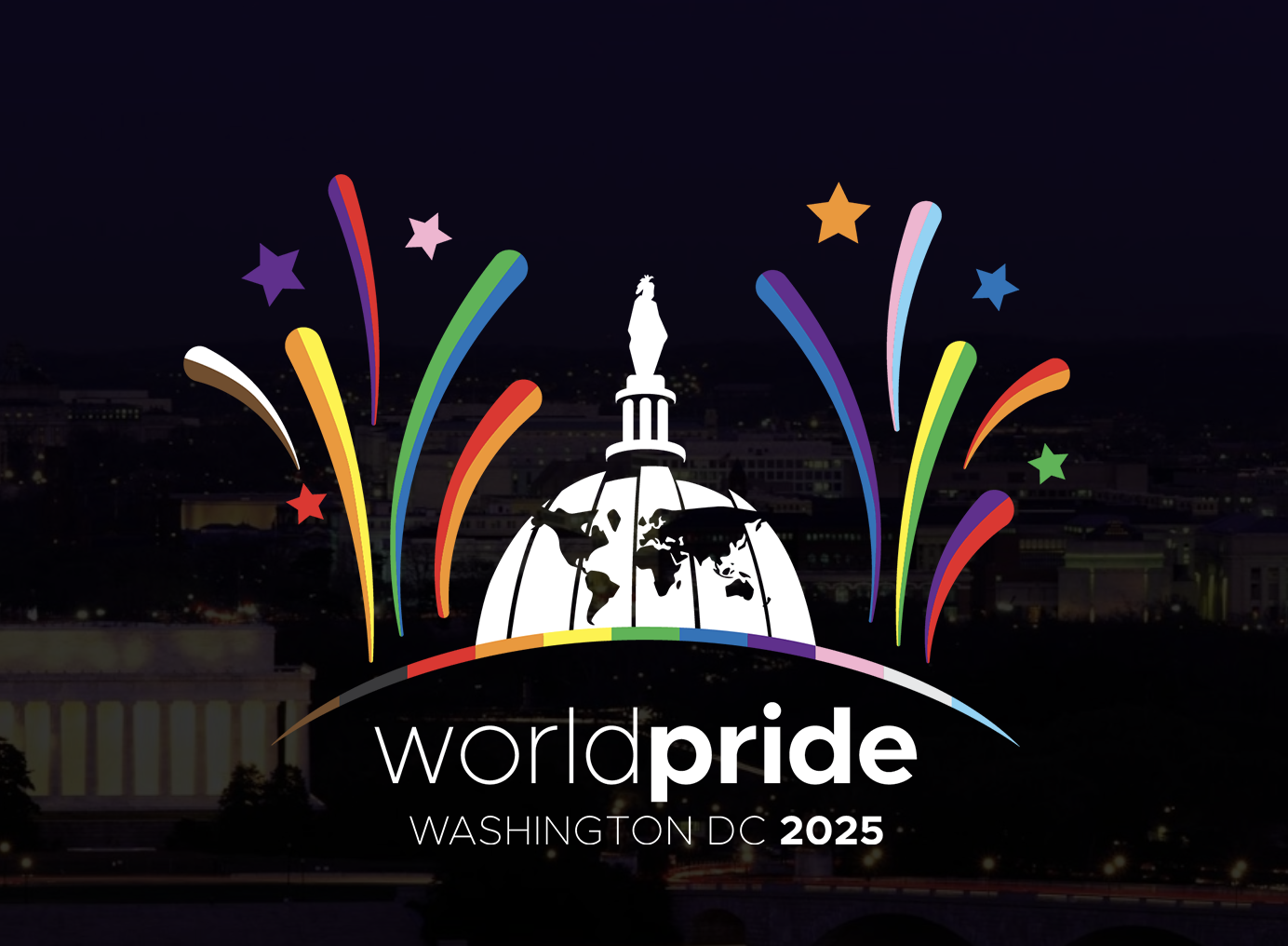
As an LGBTQI+ activist from Argentina, a country currently facing deep setbacks under an openly anti-rights government, I understand the frustration and fear many are expressing about attending WorldPride 2025 in the United States. I also understand the symbolic weight of showing up anyway.
Following the announcement by Egale Canada and the African Human Rights Coalition that they are withdrawing support for WorldPride due to the Trump administration’s anti-LGBTQI+ stance, concerns have rightly been raised about safety, complicity, and principle. These concerns must not be dismissed. But they must be responded to with a deeper strategic reflection: Visibility, presence, and collective action remain our greatest tools in confronting oppression.
Boycotts may offer symbolic protest, but absence creates silence
WorldPride is not organized by the U.S. government. It is a platform created by and for LGBTQI+ civil society — local activists, grassroots groups, trans-led collectives, BIPOC-led organizations, and everyday people building community despite hostile political environments. Boycotting this space sends a message not only to the Trump administration, but to our own movement: That when things get hard, we retreat.
History teaches us otherwise.
In 1990, amid the AIDS crisis and government neglect, activists did not boycott — they stormed the National Institutes of Health and the FDA. In 2014, when Russia passed its “gay propaganda” law, global solidarity at the Sochi Olympics became a powerful moment of protest and resistance. And in 2020, amidst a pandemic and police violence, Pride went digital but never disappeared.
If we set the precedent that global LGBTQI+ events cannot happen under right-wing or anti-LGBTQI+ governments, we will effectively disqualify a growing list of countries from hosting. That includes not only the U.S. under Trump, but Hungary, Italy, Uganda, Poland — and even my own country, Argentina, under Javier Milei. Yet ILGA World still plans to convene its 2027 conference in Buenos Aires, and rightly so. We must not surrender global platforms to the very governments that wish to erase us.
WorldPride is not a reward for good governance. It’s a tool of resistance
To those who say attending WorldPride in D.C. normalizes Trump’s policies, I say: What greater statement than queer, trans, intersex, and nonbinary people from around the world gathering defiantly in his capital? What more powerful declaration than standing visible where he would rather we vanish?
Safety is paramount, and all governments — including the U.S. — must guarantee the protection of LGBTQI+ participants. But refusing to engage is not the answer. In fact, visibility in hostile spaces has always been a hallmark of our movement’s strength. We showed up at Stonewall. We marched on Washington in 1979. We protested during the AIDS crisis, and we will show up again now — not in spite of adversity, but because of it.
We are in a global moment of rollback. Division is what our opponents want
The rise of anti-gender ideology and trans-exclusionary narratives has created fertile ground for far-right movements worldwide. In this moment, LGBTQI+ solidarity must be global, intersectional, and uncompromising. We cannot afford to fracture our own movement based on geopolitical fault lines.
Egale Canada and the African Human Rights Coalition raised legitimate criticisms — of U.S. foreign policy, immigration barriers, and systemic racism. But those issues must be confronted within WorldPride, not from outside it. We must bring those critiques into plenaries, panels, and the streets of Washington. We must create space for diasporic, racialized, and grassroots-led voices. We must use this moment to hold institutions accountable and shift the power of Pride to those most affected.
Because that is what solidarity looks like — not abandonment, but engagement.
WorldPride 2025 must not be a party disconnected from reality. It must be a protest rooted in our global truths.
Let us not cede this space. Let us make it ours.
Mariano Ruiz is the president of Derechos Humanos y Diversidad Asociación Civil in Argentina. He is also a 2019 Columbia HRAP Alumni.
-

 Virginia2 days ago
Virginia2 days agoYoungkin calls on gay Va. GOP LG candidate to exit race over alleged ‘porn’ scandal
-

 Commentary4 days ago
Commentary4 days agoA conversation about queers and class
-

 Kenya4 days ago
Kenya4 days agoKenya Red Cross-owned hotel to host anti-LGBTQ conference
-

 Opinions3 days ago
Opinions3 days agoNavigating employer-sponsored health insurance, care

